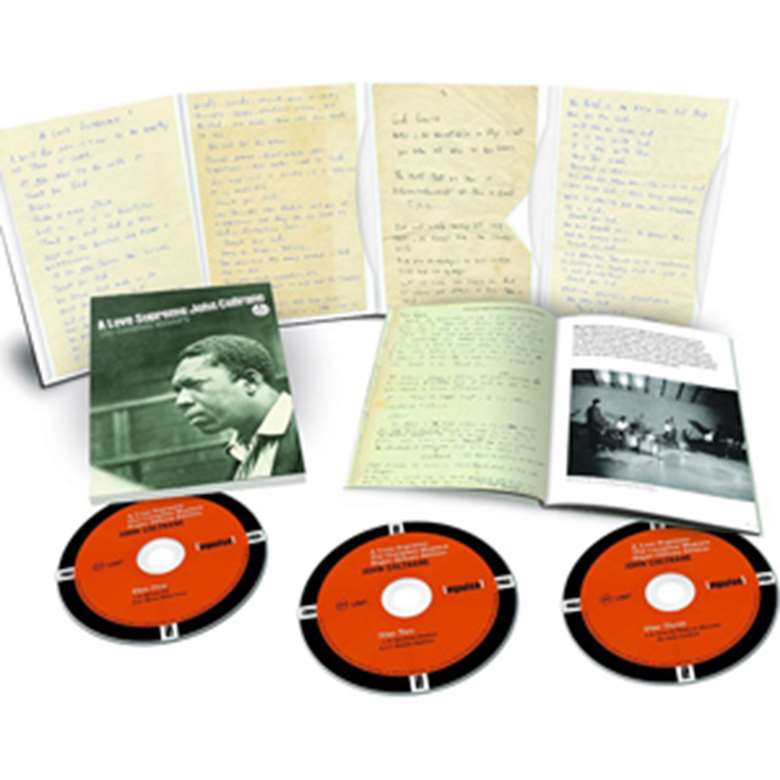John Coltrane – A Love Supreme: The Complete Masters ★★★★
Friday, January 22, 2016
Impulse Records John Coltrane (ts), McCoy Tyner (p), Jimmy Garrison (b), Elvin Jones (d), plus Archie Shepp (ts) and Art Davis (b).

John Coltrane (ts), McCoy Tyner (p), Jimmy Garrison (b), Elvin Jones (d), plus Archie Shepp (ts) and Art Davis (b). Rec. 9 and 10 December 1964 and 26 July 1965
On 9 December 1964, Coltrane and his ‘Classic Quartet’ recorded A Love Supreme, which was certified Gold in 2001 for sales in excess of 500,000 copies. Far less known is that Coltrane, his classic quartet (with McCoy Tyner, Jimmy Garrison and Elvin Jones) and two additional musicians, tenor saxophonist Archie Shepp and bassist Art Davis, returned to the studio the next day to cut the opening part of the suite again. Although we got an impression of what went on during that second day with the release of two takes numbered 1 and 2 of ‘Acknowledgement’ on 2002’s A Love Supreme DeLuxe Edition, the complete picture of what happened – in other words all takes, overdubs and studio chatter – now become available on A Love Supreme: The Complete Masters, released to celebrate both the 50th anniversary of the recording session and the 60th anniversary of the Verve label, with myriad back catalogue releases, digital exclusives and box sets promised through to the end of 2016.
Ashley Khan, who wrote the liner notes of the DeLuxe Edition, once again writes some fine liner notes for The Complete Masters and there is a personal introduction to ‘A Love Supreme’ by Carlos Santana (for whom Khan recently ghosted his autobiography). There is additional information about the live set in Antibes but especially interesting is the iconography that has been unearthed especially for this release.
The question of what music has and hasn’t been released before gets a bit complicated, so bear with me. First, let’s make clear these comments apply to the 3CD set, since there is also an ‘economy’ 2CD set being released simultaneously just to muddy the waters. So, on the 3CD set, Disc 1 gives us the original stereo album as released on vinyl as Impulse! AS-77, which previously appeared on the DeLuxe Edition, plus two previously unreleased mono tracks: Part III ‘Pursuance’ and Part IV ‘Psalm’. These are from Coltrane’s own Mono Reference masters intended for his home consumption. Since they are the stereo tracks collapsed into mono they do not add to our knowledge of this piece. Disc 2 comprises eleven tracks in all, of which four tracks previously appeared on the DeLuxe Edition. These 11 tracks together account for all the surviving tracks from the two days Coltrane recorded A Love Supreme – the quartet on day one and the sextet on day two. From day one, the quartet session, the two alternative takes of ‘Resolution’ (take 4 alternate, the only other complete version other than the one that was released, and take 6 breakdown) previously appeared on the DeLuxe Edition and from this same quartet session we now have a further two vocal overdubs on ‘Acknowledgement’ (overdub 2 and overdub 3) and an undubbed version of ‘Psalm’ on The Complete Masters. The ‘Acknowledgement’ overdubs suggest Coltrane was experimenting with a thicker voice texture at the end; he finally decided to go with the first vocal overdub on the released track. The undubbed version of ‘Psalm’ has Coltrane playing one saxophone and missing the resolution (the released version contains a second horn – alto saxophone – and of course the all important resolution).
From the sextet session the following day, in other words, the ‘Classic Quartet’ plus Shepp and Davis, we previously had takes 1 and 2 of ‘Acknowledgement’ on the DeLuxe Edition, to which we now have take 3 (breakdown with studio chatter), take 4 (further alternate), take 5 (false start) and take 6 (further alternate) of the same piece – i.e. ‘Acknowledgement’ by the sextet. The whole of Disc 3, Coltrane’s only known live performance of ‘A Love Supreme’ performed at the Festival Mondial du Jazz Antibes on 26 July 1965, previously appeared on the DeLuxe Edition in 2002. Insofar as the ‘sextet’ session is concerned, The Complete Masters is the first time we have all six takes of ‘Acknowledgement,’ the opening section of the suite, in their entirety by the expanded group. It provides a window into how Coltrane allowed music to develop in the studio. Quite where he was heading with this particular piece we’ll never know, because the definitive version of ‘A Love Supreme’ is of course the ‘quartet’ version recorded the day before. But what we do get is a glimpse of his thinking using two saxophones that would ultimately be consolidated by the addition of Pharoah Sanders. In the first half of 1965, we see Coltrane’s playing become increasingly more outward bound (certainly the influence of Albert Ayler played at least a part in this) and after recording Ascension on 28 June 1965 with both Shepp and Sanders in the line-up (and, significantly Art Davis), Sanders joined Coltrane’s ensemble permanently in September 1965. Coltrane’s thinking about the inclusion of Art Davis in the ‘sextet’ recordings is less clear; certainly the expression of time becomes a little more ambiguous with two basses and possibly he was thinking ahead to a more abstract approach to time that was fulfilled when Rashied Ali replaced Elvin Jones and Alice Coltrane replaced McCoy Tyner, but that, as they say, is a whole other can of worms.
– Stuart Nicholson